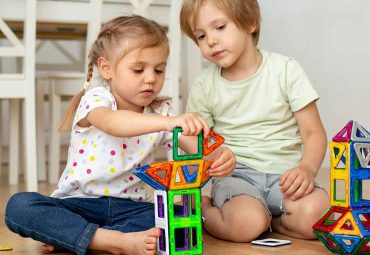Who Can Benefit from Speech Therapy?
Speech therapy can benefit children, teens, and toddlers. If someone is having difficulty speaking, understanding, or communicating, speech therapy can be an effective solution. Nevertheless, this therapy speech improves communication skills, increases confidence, and makes daily life interactions easier. Speech therapy may help if your child needs speech therapy in Delhi, such as:
- Children with speech delay or late talking issues
- Kids with pronunciation problems (articulation issues)
- Children with stammering or stuttering
- Individuals with language delay or learning difficulties
- Children affected by Autism Spectrum Disorder (ASD)
- Kids with speech loss due to stroke, injury, or neurological conditions
- People with voice disorders or hoarseness
- Individuals struggling with social communication
- Hearing-impaired individuals who wish to develop clear speech
- Anyone wanting to improve communication confidence
Speech Therapy Services at Nupal CDC
Nupal CDC's speech therapy in Delhi is designed for individuals and kids with speech, language, and communication challenges. Furthermore, let’s discuss our services one by one:
1. Early Intervention for Young Children
Intervention implies that the children start developing their speaking skills as early as possible. We help children improve their speaking skills, as they naturally develop them very quickly.
2. Speech Delay and Late Talking Support
It is an effective facility for children who do not begin speaking early. At Nupual CDC, our expert and skilled pediatric speech therapist near me helps them gradually learn speech sounds, words, and sentences. We ensure that practice and exercises will enhance their speaking skills.
3. Pronunciation & Articulation Training
Our therapy aims to develop clear, correct articulation. Incorrect articulations are recognized, and special articulation exercises are conducted. It makes the patient's speech clear and confident, and can also be applicable to both children and adult patients.
4. Language Development Therapy
Improvement in both spoken and written language is evident in language development therapy. Patients are assisted in expanding vocabularies, sentences, and understanding. This type of therapy enhances and refines all forms of patient communication.
5. Stuttering/Fluency Therapy
Our best speech therapist in Delhi aims at solving stuttering or fluency problems, enabling the development of fluid speech with confidence. Our therapy speech language services focus on breathing, pacing, and confidence-building. Also, it reduces more hesitation in the speech.
6. Voice Therapy & Tone Improvement
Our voice therapy can be used by anyone experiencing voice strain, pitch problems, or unclear tone. Therefore, it combines vocal exercises, breathing, and pitch control to maintain a strong, clear voice.
7. Autism Spectrum Communication Support
A speech therapy in Delhi that suits their individual needs is created for autistic children. It is mainly aimed at increasing their capacity for communication and social interaction, as well as their awareness. Their communication and independence are fostered.
8. Social Communication and Interaction Skills
At Nupal CDC, this service develops social skills such as maintaining eye contact, controlling conversations, turn-taking, and expressing emotions, as patients are taught to handle real-life scenarios, which boosts their self-confidence and comfort around people.
9. Oral Motor & Feeding Therapy
If you are searching for the best speech and language therapy centre near me, Nupal CDC is the best choice. Our oral motor therapy focuses on strengthening the muscles of the mouth, which are key to both speech and feeding.
How Speech Therapy Works at Nupal CDC?
When it comes to speech therapist online consultation, Nupal CDC helps children improve their communication skills. Our therapy sessions are based on scientific methods, personalized plans, and expert guidance. We ensure to follow a structured plan according to each client's needs. Furthermore, below are crucial steps that explain the complete process of speech therapy:
1. We offer a Pre-Assessment Session
Our speech therapist online consultation conducts a detailed evaluation of speech therapy, understanding, and communication skills.
2. We offer an Individual Therapy Plan
After assessment, we provide an individualized plan that includes short- and long-term goals, such as pronunciation improvement, fluency development, or expressive language enhancement.
3. We Ensure to Make Regular Sessions Interactive
For us, every client is imperative. We provide customized plans, including specific exercises, activities, and learning techniques. Additionally, we ensure every therapy activity is interactive by telling exciting stories, playing songs, and including fun games.
4. We Track Regular Monitoring
When you opt for our speech therapy in Delhi, we ensure to track your regular progress and update the plan accordingly.
5. We Provide Parent Coaching
We ensure to include parents so that kids feel more excited and interact more. Also, we share simple activities with parents so they can practice at home to maintain consistency.
What are the Benefits of Speech Therapy?
Check out the fundamental benefits of speech therapy that every individual should know:
1. Enhanced Speech Clarity and Articulation: Our skilled and experienced therapists help kids and parents to improve their communication skills, increasing confidence.
2. Boost Confidence and Self-Esteem: By preventing communication barriers, children often experience less anxiety and more social confidence.
3. Better Social Communication: Our speech therapy will teach you imperative skills, such as maintaining eye contact, taking the stand in conversation, and interpreting non-verbal cues.
4. Improved Language Skills (Expressive or Receptive): Speech therapy enhances the capability to understand others and express one’s point of view, thoughts, ideas, and feelings more effectively.
5. Enhances Swallowing Function: Speech Therapy sessions ensure that exercises can strengthen muscles, making swallowing easier and safer for kids.
Why Parents Trust Nupal CDC?
At Nupal CDC, we provide a supportive, warm, and kid-friendly space where kids feel more comfortable and expressive. Furthermore, we focus on the child’s overall growth and development to ensure they feel more confident, communicate properly, and learn life skills. Our experienced therapists provide modern teaching methods, and our parent-friendly approach makes us the preferred choice for speech therapy services. Therefore, parents value our transparency, progress updates, and the seamless integration of our therapies into their daily lives at school and home.
Location & Accessibility
Nupal CDC is centrally located in Delhi, making it easily accessible for families across the NCR. Therapy rooms are child-friendly, well-equipped, and private to ensure comfort and focus.
Addressing Parents’ Concerns
Here are some concerning topics that parents usually think about:
1. Understanding the Potential Advantages: Parents want transparency on the end results. That is why we provide regular progress updates and clear goals.
2. Qualification of the Therapists: All our therapy sessions are led by our qualified speech therapists who have pediatric expertise.
3. Cost and Coverage: At Nupal CDC, we provide a transparent fee structure and receipts. Also, our insurance support varies depending on the plan.
4. Family Involvement: In speech therapies, parents are active partners who ensure that therapy continues at home.
Language & Receptive Disorders
There are children with a receptive language disorder, which prevents them from easily understanding and interpreting spoken words. These children are likely unable to understand the commands given, have a limited command of the vocabulary they are familiar with, and have difficulty articulating themselves as they wish. While all this may seem minor at times, it can affect a child's education and confidence.
To overcome this problem, the pediatric speech therapist Delhi uses fun and play activities for the child. Playing games, reading books, singing, and other activities help the child gradually improve their knowledge and speaking skills. During this process, the child learns rather than finding the study process boring or unpleasant.
At Nupal CDC, we believe all children deserve the opportunity and the right to speak, experience, and express their emotions. Our speech therapy objectives in Delhi focus on developing your child's social skills and communication effectiveness. Here, children develop speech skills and learn to harness them. Thus, it is the best way to connect with the world with utmost confidence and to identify their own voices.
CALL TODAY TO HAVE INITIAL SPEECH THERAPY CONSULTATION (+91) 9910388103
Email: info@nupalcdc.com
Visit us: B-180 First Floor, Gujranwala Town Part 1, Delhi 110009, India




